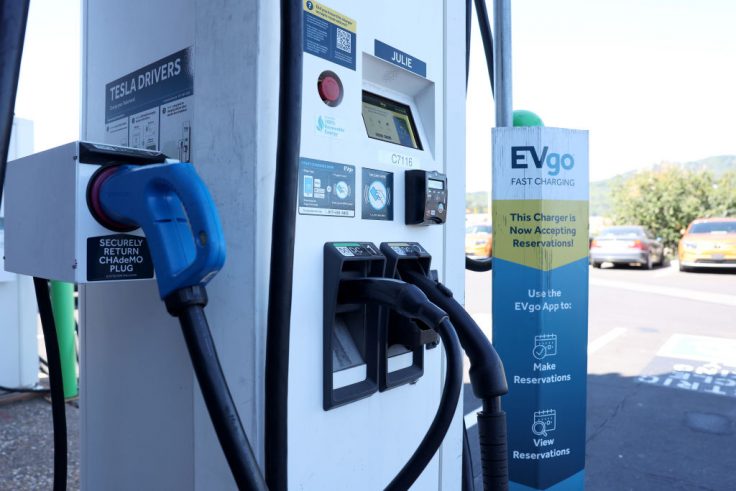The Biden administration touted the opening of its first taxpayer-funded electric vehicle charging station as proof that "Bidenomics is delivering for Americans." Just days after the opening, the station sat empty.
The inaugural station—which opened on Dec. 8, two years after the administration allocated $7.5 billion to build electric vehicle chargers across the country—is located in London, Ohio, a small town situated just southwest of Columbus. The station features an Arby's, a Cinnabon, and plenty of merchandise for truckers. It also features few to no users.
"At about 10:30 a.m. on a Tuesday, nobody was using the chargers," Inside Climate News reported after visiting the station.
The Biden administration has centered its "modern American industrial strategy" on what it calls a "clean energy economy" full of blue-collar electric vehicle manufacturing jobs. As part of that push, the administration in 2021 secured $7.5 billion in taxpayer funding to build "a national network of EV chargers" through its bipartisan infrastructure law.
In the two years after President Joe Biden signed that bill, the administration failed to install a single charger, despite sending $2 billion in taxpayer funds to states to build new stations. When the first station finally opened in Ohio, the White House nonetheless said its plan to build "a national network of EV chargers … provides a case study for how Bidenomics is delivering for Americans by making smart public investments."
Demand for electric vehicles, however, has lagged behind expectations.
Earlier this week, for example, Ford announced plans to cut the production of its electric truck in half, citing insufficient demand. While Ford planned to produce 3,200 F-150 Lightnings per week in 2024, it will now produce just 1,600, with the company saying in a memo that "changing market demands" motivated the cuts. Roughly 98 percent of the F-Series trucks Ford sold in 2022 were gas-powered.
"We'll continue to match production with consumer demand," a Ford spokeswoman said.
Just hours before that announcement, the White House—which did not return a request for comment—claimed in an economic report that the "U.S. consumer market for EVs is rapidly growing." While the memo also said "overall consumer satisfaction with electric vehicles is very high," just 19 percent of Americans say it's "very" or "extremely" likely they'll purchase an electric vehicle when they need a new car, according to an Associated Press poll.
The auto industry has also pushed back on Biden's claim that the transition to electric vehicles will create American jobs. Electric vehicles require fewer parts—and fewer workers—to build, prompting auto industry groups to argue that Biden's "clean energy economy" will actually hurt autoworkers.
"The EV transition is at serious risk of becoming a race to the bottom," United Auto Workers president Shawn Fain wrote in a June memo to members. The union is known for its staunch support for Democrats, having endorsed Biden in 2020 and spent millions of dollars to elect his fellow party members.
